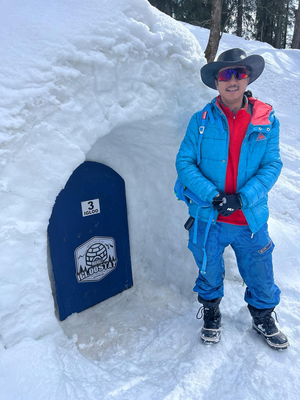As the winter sun begins its descent behind the Hampta Pass in the Himalayas, a subtle thawing begins in the heart of mountain natives.
Amid this transition, an igloo stands as a testament to resilience and ingenuity. For those like the igloo men, harnessing indigenous wisdom, the blanket of snow signifies not hardship, but rather the promise of local prosperity.
Winters may be harsh for some. But for them, every snowflake holds the potential for a bountiful livelihood.
The duo, Tashi Dorjee and Vikas Kumar, both professional mountaineers and skiers, of Keylinga Himalayan Adventures have built igloos for the eighth season in a tiny hamlet, the base for the Hampta trek.
“As snow starts melting, our hearts too thaw,” remarked an emotional Dorjee, the brain behind the first-of-its-kind initiative to build igloos without government support.
Every year with the onset of snowfall, they start building igloos by using their traditional knowledge close to the Buddhist village of Sethan, 12 km uphill from Manali, at an altitude of 2,700 metre, amid the backdrop of Dhauladhar and the Pir-Panjal ranges.
The igloos are located on ski slopes that have more than three feet of snow and it will last till March-end.
Seeing tourist buzz, several other local youths have also entered into the venture of setting up man-made igloos of different shapes and sizes for the backpackers in the area.
Locals say with word-of-mouth communication, the entire area, originally a shepherd route in summer, has been christened as the Igloo Valley.
The overlooking Hampta Pass is a corridor that connects Kullu with the Lahaul Valley.
“Though our hearts are happy that spring will soon set in and this mountain will turn into a valley of flowers, but that will not attract an influx of tourists. For us a blanket of snow is a ray of hope,” added Dorjee, who was born and brought up in the area.
Members of the hospitality industry believe if the government promotes such initiatives for sustainable tourism, the local economy will not only get a boost but also result in opportunities for mountain communities.
Locals say the igloos not only help conserving their traditional knowledge but also preserving natural resources in an innovative manner — through the artificial making of vertical ice mountains to recharge aquifers for longer duration.
“It is a once-in-life opportunity to live like Arctic indigenous people of Alaska,” remarked tourist Neha Katyal from New Delhi.
“We are really excited to see the snowy landscape even in March. Earlier, we were a little bit scared about staying in an igloo as we feared its collapse. Our hosts told us that it is strong enough to withstand even snow storms. The inside temperature at night was at least 10 degrees Celsius less than outside,” her husband Abhishek said, adding that “we really enjoyed relishing ‘rajma chawal’ and ‘kadhi’, besides watching a Hindi movie under the star-studded sky on a screen chiseled from an ice slab”.
The business is managed by six-eight people, who build the igloos manually and cook the food for the guests.
Igloo owner Dorjee told IANS this winter saw decreasing snowfall and warmer temperatures, “The area was totally bereft of snow cover in December and January and we were desperately awaiting the onset of heavy snow.”
His partner Vikas Kumar added, “Now the snowing season is going to end soon, so is our business. For us, snow brings good luck as it denotes growth and the accomplishment of certain goals through hard work and dedication.”
Igloo owners say the government should promote construction of igloos on the pattern of the state’s rural homestay scheme, which started in 2008.
To reach an igloo unit, one has to trudge the snow-laden path for half an hour, depending upon the location where they have been set up. They are normally set up on the land leased by the Forest Department.
Only a four-wheel drive vehicle, which is provided by the host and covered within the accommodation cost, will take you up to Sethan, the last motorable village. From there, potters will take the luggage.
Depending on the snow conditions, a team of five-eight people can build an igloo measuring six feet in circumference in a couple of hours.
Himachal Pradesh received large deficit winter precipitation of 31 per cent since January 1 with nine out of 12 districts having received deficient precipitation, says the Meteorological Centre in Shimla in the first week of March.
The state received isolated rainfall in January with weak activity on many days and one day of normal activity on January 31.
In February, the state received five spells of precipitation with moderate precipitation at few places. Kullu and Mandi districts received normal rainfall with excess precipitation in Chamba district.
Meteorologists told IANS that warmer winters continued for the second consecutive year across India.
A seasoned journalist with over two decades of experience, Vishal writes on a wide range of subjects which include biodiversity, climate change and links between environment & development. He also covers politics and other developments in Punjab and Himachal Pradesh. He lives in Chandigarh & Shimla.



